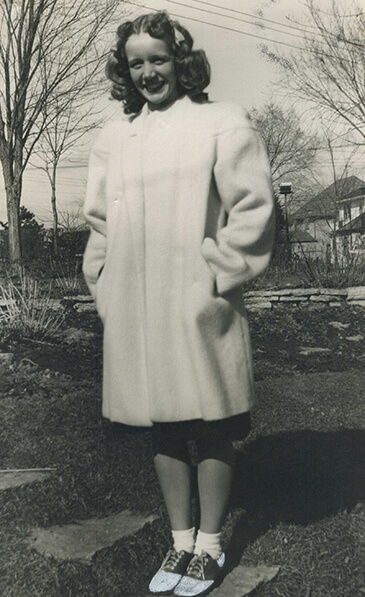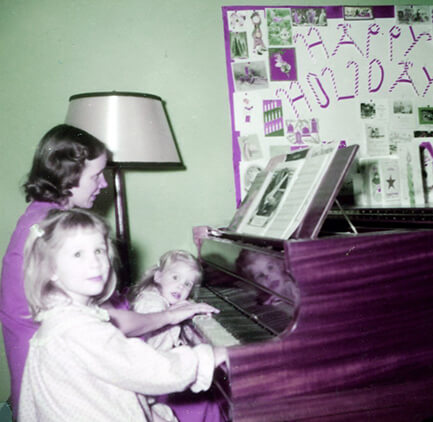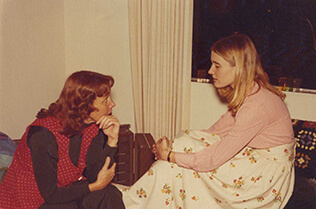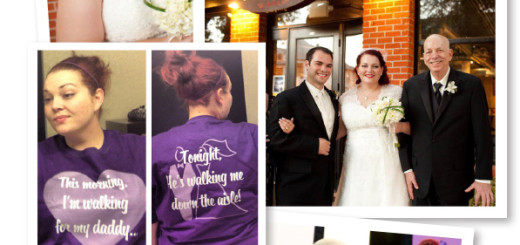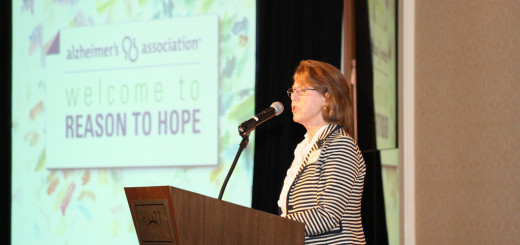Roseville woman continues to volunteer 17 years after mother’s death
Jennifer Harrington cared for her mother, Joan Preston, who was diagnosed with Alzheimer’s disease. At the time, it was the early 2000s and Jennifer felt lost. She found the Alzheimer’s Association® and called their 24/7 Helpline (800.272.3900) to ask for help. A few months after her mother’s death, Jennifer returned to the Association to volunteer. Seventeen years later and she continues to share her first-hand experience and help others learn about the disease.
A female tech writer
Joan Preston was born in Minneapolis, Minnesota. There she met her husband, had their daughter Jennifer and then moved to California. There they had two more children – a boy and a girl. When Jennifer was in high school, the couple divorced.
Now a single mother of three, Joan started doing the only skill she knew, typing. She began working in a typing pool with a handful of other women for a computer company, IBM (famous for revolutionizing personal computers). Joan’s skill and proficiency shown through and she was promoted to editor, writing technical manuals.
“She wasn’t confident about her own abilities even though she was an editor at IBM,” said Jennifer. “When she was in social situations where she was comfortable, she could sparkle. She was a good conversationalist. She didn’t recognize that as a value.”
Getting diagnosed
When Joan was in her 60s, she began to get lost in the neighborhood she’d lived in for years. She stopped paying her bills and could no longer balance a checkbook. Jennifer knew her mother needed help.
Joan was resistant to seeing a doctor, so Jennifer pretended that she was going to see the doctor herself and asked Joan if she would come with her. Jennifer said, “We got a doctor that was very good at diagnosing the disease without the person feeling like they were under the microscope.”
Joan was diagnosed with Alzheimer’s disease.
After Joan’s diagnosis, Jennifer called the Alzheimer’s Association’s 24/7 Helpline (800.272.3900). “I called on the phone and said, ‘Help! I don’t know what to do, I’m lost here,’” said Jennifer. “She said, ‘The first thing you have to do is get a trust.’ She walked me through the other things [I needed to do]. I was very fortunate to find somebody to start me on a path.”
Finding a care setting
Stigma and stereotypes are a significant obstacle to well-being and quality of life for those with dementia and their families. Relationships with family may change. Friends may refuse to believe a diagnosis. While it was clear to Jennifer that Joan had Alzheimer’s, other members of her family weren’t convinced.
“A whole group of family thought I was overreacting,” said Jennifer. “I shouldn’t be doing anything; Mom is just fine. That was when I decided to find a place for her near me but not tell other people I was doing that. I’d go by myself and look at places until I found one that had a similar layout to her apartment.”
Jennifer wanted to get Joan’s input while she was still capable of making decisions. She mistakenly thought it would be like taking Joan to view college campuses to choose a college. “I was living in fairyland,” said Jennifer. “I was imagining a Sunday drive, we’d go to four or five places, she’d say, ‘Oh! I love this one.’ But that didn’t happen.”
“I could have slammed the door in frustration and done nothing,” said Jennifer. “Instead, I sat down and asked her why it was a horrible experience in her view. The reason was, ‘They’ll have a long table and we’ll have to sit at the table and they’ll make us eat our vegetables.’ It was valuable information. When I went to look for places for her to stay, I knew what would trigger her emotionally and had to find a place with café stye eating.”
Luckily, Jennifer was able to find her mother a care setting that was almost identical to her current apartment’s layout. When Joan’s landlord suddenly asked her to leave her Bay Area apartment, Jennifer was able to step in and easily transition her mother from her old apartment to her new home in Roseville.
Hospitalization
Alzheimer’s disease causes a number of changes in the brain and body. Depending on the stage of the disease, this can include having trouble with balance. As Joan’s disease progressed, she fell and was taken to the hospital.
After receiving the care she needed, Joan was released from the hospital on a Sunday night. The nursing staff helped Joan into Jennifer’s car and the pair drove back to Joan’s home at the care setting. “I drove her back to her [care setting], walked her in, got her settled, waved good-bye and drove off,” said Jennifer. “I immediately got a phone call [from the care setting]. They said, ‘Sorry, we can’t accept your mom. She is too unsteady on her feet.’”
Jennifer returned to the care setting, picked up her mother and drove around the city unsure of what to do. It was Sunday night, nothing was open. At first Jennifer thought about bringing her mother to her home. However, her house wasn’t set up for someone with dementia. She could easily hurt herself, trip on something Jennifer’s children had left out, or simply walk out the front door and get lost.
Eventually, Jennifer decided to return to the hospital, explained the situation and was able to get her mother readmitted. The next day, Jennifer contacted a care setting to see if they had space for her mother. With great luck, a spot had just opened up and Joan would be able to move in there.
“I was power of attorney for healthcare,” said Jennifer. “When they released her from the hospital, I didn’t know what a ‘release nurse’ was. I didn’t know I had the option of declining [her release]. I didn’t think I had a choice [when the care setting called me to pick up my mom. The staff] just stood there and waved cheerfully at me as I drove away. I had no idea what to do, I had no idea what my options were.”
Joan remained in that care setting until her death in 2008.
Becoming a volunteer
A few months after her mother’s death, Jennifer became a volunteer for the Alzheimer’s Association. There, she became a community educator, someone who provides Alzheimer’s Association education programs to community audiences.
“It’s rewarding because I have real information both from experience and the materials that the Association gives me,” said Jennifer. “The Association keeps up on the latest research really well and keeps materials updated. I can make a real difference by giving [the community] information I didn’t have myself. Like what kinds of things you can do to make their life and your life better.”
Finding purpose
Despite the death of her mother being nearly twenty years ago, Jennifer continues to dedicate her time to the Alzheimer’s Association. “[Being a volunteer] gives me purpose,” said Jennifer. “I could go on a walk every day, or [improve] my golf game, but I needed a purpose outside of myself. Something I’m already trained to do. I have the background and experience to make it meaningful to people.”
Jennifer encourages others to become Alzheimer’s Association volunteers knowing that there are opportunities for everyone no matter your interest. “This disease is important,” said Jennifer “We haven’t conquered it yet. This [non-profit] is as important as any of the other ones in terms of the value it provides to people who are really in need.”
Moments of joy
An Alzheimer’s or dementia diagnosis can be life-altering, but it doesn’t mean everything about living with the disease is bad. Jennifer found Alzheimer’s to be a kind of blessing for her mother who forgot she hated vegetables and also fell in love for the first time.
“She was truly in love,” said Jennifer. “That experience of just being over the moon for somebody. She didn’t like it when I visited because it meant time away from her boyfriend. They would spend all day, every day, together. She always wanted to fall in love. She got her wish.”
Jennifer hopes that other caregivers will be able to find moments of joy with their loved ones. To let them take the lead and try to see the world through new eyes. “I realized if I took her on a walk to get ice cream, it was wonderful for her,” said Jennifer. “It was like a walk with a child. ‘Oh, look how pretty those flowers are!’ Adults take a walk and don’t notice, but she did. I realized I could stop and enjoy the flowers too.
“Those are moments that I remember that are part of the whole experience. To be able to pause for a minute and enjoy being alive. She had something to teach me too.”
If you’re interested in becoming an Alzheimer’s Association volunteer visit alz.org/norcal/volunteers.
For information on resources for caregivers visit alz.org/caregiving.





